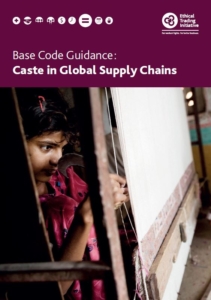Business operations in caste-affected countries are at a high risk of being based on the economic exploitation or seclusion of caste-affected communities and others at the “low” end of the caste hierarchy.
Violations of both national legislation as well as international law, in particular the international labour standards, often occur.
Common examples of caste discrimination in business operations are:
- Exploitation of workers from caste-affected communities, including the use of children and bonded labourers (debt slaves), working under hazardous conditions for a minimal pay
- Discrimination in employment practices – applicants from caste-affected communities never considered for skilled jobs
- Discrimination in the services and utilities offered by an employer, such as housing, health care, and education and training
- Misappropriation of land belonging or allocated to caste-affected communities
How can your company avoid complicity?
If your company is either directly operating in or sourcing from a caste-affected country, your company could be complicit in the discrimination and exploitation of caste-affected communities.
Several tools exist to help you assess your business operations and remedy any harm done:
Ethical Trading Initiative Base Code Guidance on Caste in Global Supply Chains
This
The guidance explains how caste, if unaddressed, can fundamentally undermine the implementation of the ETI Base Code and ensuring compliance on labour rights.
This guidance also sets out good governance and management practices to enable businesses to proactively counter caste-based discrimination, respect fundamental human rights, and advance access to decent work for all.
The Dalit Discrimination Check is a web-tool developed specifically to help companies identify and prevent discrimination and exploitation of Dalits in their Indian operations and suppliers. It is designed as a comprehensive checklist with self-guided questions and indicators of possible violations of national Indian law and international law. It has been developed by the Danish Ministry of Foreign Affairs, IDSN and the Danish Institute for Human Rights as part of their Human Rights and Business Project.
The Ambedkar Principles are developed to assist foreign investors in South Asia. They include a set of employment principles as well as a set of additional principles adressing economic and social exclusion of Dalits.
ISO 26000 on Caste Discrimination. Caste discrimination has now been highlighted by the widely recognised standard – the ISO 26000 on social responsibility.
Read the IDSN submission to the Working Group on the issue of human rights and transnational corporations and other business enterprises on the first annual Forum on Business and Human Rights in connection with the public consultation on The Forum on Human Rights and Business in May 2012.
Study
Diversity in the workforce: why it is good for business
Author: Ashwini Deshpande, Professor of Economics at the Delhi School of Economics, University of Delhi. Prepared in collaboration with International Labour Organization (ILO) for the International Dalit Solidarity Network (IDSN).
Database
IDSN has created an extensive database on caste-based discrimination.
Documentation on business and human rights



